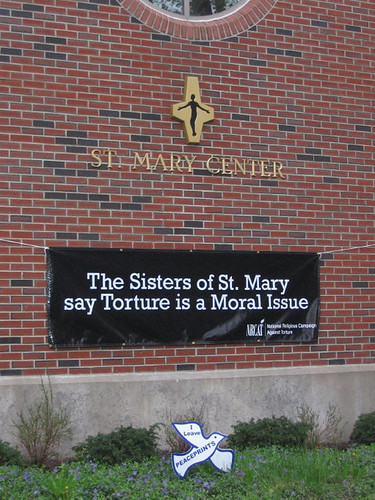USCCB introduces study guide that examines torture as moral issue

In 2006 the USCCB signed on to the statement of conscience by the National Religious Campaign Against Torture. The statement reads:
“Torture violates the basic dignity of the human person that all religions, in their highest ideals, hold dear. It degrades everyone involved – policymakers, perpetrators and victims. It contradicts our nation’s most cherished values. Any policies that permit torture and inhumane treatment are shocking and morally intolerable. Nothing less is at stake in the torture abuse crisis than the soul of our nation. What does it signify if torture is condemned in word but allowed in deed? Let America abolish torture now – without exceptions.”
This past Monday the USCCB continued its statement in opposition to torture as it made a Catholic study guide on the issue of torture available on its website.
It is sad that there is a need for such a guide, but it is wonderful that the Church is taking a strong position against the policies of our government which have encouraged its use. The guide includes opposition to torture as part of a consistent ethic of life and quotes the encyclicals of Pope John Paul II. To view and print out a copy of the guide you can go to www.usccb.org/sdwp/TortureIsAMoralIssueCatholicStudyGuide.pdf
An article announcing the guide’s release is below.
USCCB introduces study guide that examines torture as moral issue
By Dennis Sadowski (Catholic News Service)
Published Jun 24, 2008
WASHINGTON (CNS) -- The dignity and respect of the human person is the cornerstone of the U.S. bishops' new study guide on torture as a moral issue.
The guide, titled "Torture: Torture Is a Moral Issue, a Catholic Study Guide," looks at church teaching as it relates to the use of torture by government authorities around the world and mixes in biblical passages that evoke Jesus' call to "love your enemies."
Written by the Catholic Leadership Council within the National Religious Campaign Against Torture, the guide was written for use by discussion groups and classes in Catholic settings as well as individuals, families and others interested in studying the issue.
The guide was introduced June 23 in the midst of Torture Awareness Month as designated by religious, human rights and civil liberties organizations. Pax Christi USA, the Maryknoll Office of Global Concerns and the Sisters of St. Francis of Philadelphia are among more than 190 religious organizations that have joined the interfaith campaign.
The guide is available for downloading on the Web at: www.usccb.org/sdwp/TortureIsAMoralIssueCatholicStudyGuide.pdf .
"We wanted to have some teaching prepared on what was a timely issue and to reflect our concern for what is happening because there's been a lot of debate, and put it into a context of overall Catholic social teaching about human rights," explained Virginia Farris, foreign policy adviser for Eurasia and human rights in the Department of Justice, Peace and Human Development of the U.S. Conference of Catholic Bishops.
"We felt this was another effort we could make to expand discussion in Catholic settings about a very important issue, and to look at ways to develop a more positive environment whereby the justification for torture is no longer there," Farris said.
Quoting encyclicals by Pope John Paul II and Pope Benedict XVI that call for the prohibition of torture, the guide offers a thorough review of Catholic teaching on the topic while giving users action steps as follow-up.
The guide does not just address questions related to U.S. policies in the treatment of detainees in locations around the world, but also raises concerns about the practice of torture and harsh interrogation techniques by more than 150 governments around the world.
The 36-page guide cites several international treaties that outlaw torture; they include the Geneva Conventions of 1949 and the 1984 U.N. Convention Against Torture.
It is divided into four chapters, each focusing on a different topic for discussion and reflection.
Chapter 1 focuses on church teaching about the dignity of every person and the importance of building a culture of life across society.
The second chapter looks at torture itself and the reasons it poses concerns for the church. It also draws information from Catholic leaders, including Pope John Paul, who have written or made statements opposing torture in any form. A section also examines Pope Benedict's 2007 encyclical on hope and his supporting statements during his papal trip to the United States in April.
Chapter 3 examines Jesus' Gospel call to love one another, including those who may be considered "our enemies." There are several biblical passages as well as citations from Pope Benedict's encyclical, "God Is Love."
The guide's final chapter promotes the discussion of actions that anyone can take to address the issue of torture and to raise awareness of its importance as a moral matter.
An appendix includes a letter written in December 2007 by Bishop Thomas G. Wenski of Orlando, Fla., chairman of the bishops' Committee on International Policy, to members of the U.S. Senate. The letter spells out the moral reasons the church opposes torture.
Meanwhile, as part of Torture Awareness Month activities, nearly 300 churches and faith communities across the country were joining a public witness concerning torture. About two dozen Catholic parishes and organizations were part of the effort.
Vinyl black-and-white banners bearing messages such as "Torture is wrong" or "Torture is a moral issue" were being displayed throughout June.
The National Religious Campaign Against Torture was formed in 2006 with the goal of ending the torture they say the U.S. carries out, as well as cruel, inhuman and degrading treatment of detainees and prisoners.











